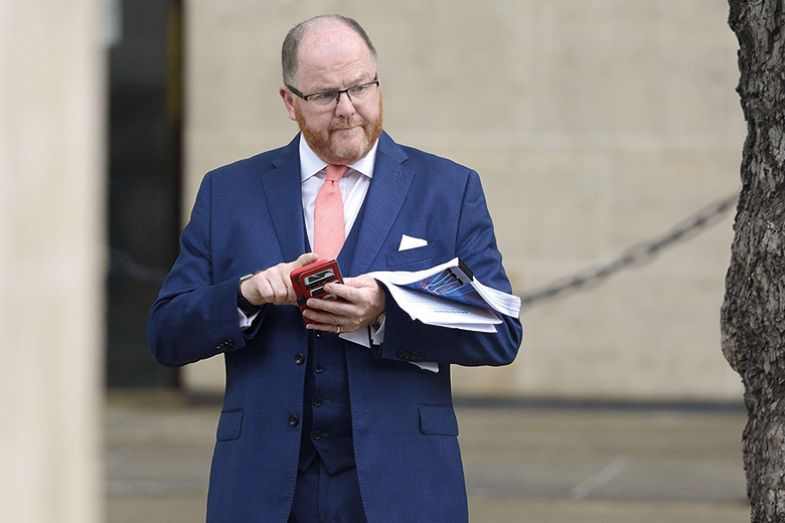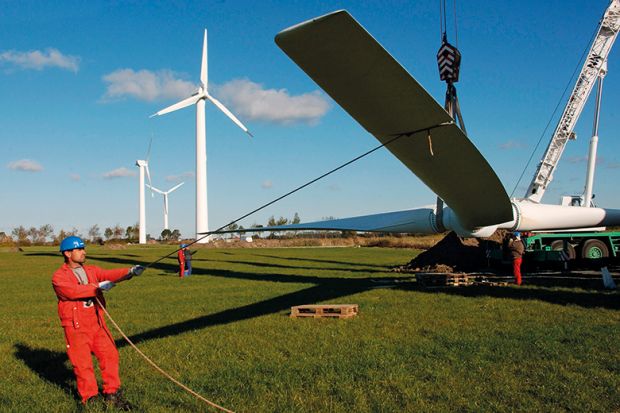Strategic alliances with departments responsible for “levelling up” and net zero carbon targets may be the only way for the UK’s new science minister, George Freeman, to rescue a promise that the Westminster government will spend £22 billion a year on research by 2024-25, experts have warned.
With a month to go until the government’s spending review, there is growing unease among MPs and the research community that the government will drop its manifesto commitment on direct research investment, which has been repeatedly omitted from government communications in recent months.
Instead, ministers have chosen to confirm the £22 billion aspiration but declined to attach any firm date to what John Womersley, former chief executive of the Science and Technology Facilities Council, called a “once-in-a-generation statement of scientific intent”.
“Without a date it’s likely these important spending increases will simply be delayed forever, which is worse than if the commitment was cancelled altogether,” said Professor Womersley. “At least, you could then have a proper fight about it.”
The task of lobbying for the 2024 commitment inside government will fall largely on Mr Freeman, who was appointed science minister earlier this month, having previously served as life sciences minister under David Cameron.
Although his power is limited, as a junior minister, Mr Freeman could save the science budget by forging links with more influential ministers whose departments’ goals may overlap with his own, said Professor Womersley.
“Michael Gove – who is charged with enacting the levelling-up agenda – is someone with whom he needs to make friends quickly,” he advised. “One way to deliver this agenda is through research spending and Freeman can make effective arguments about how science money can be spent in a way that will deliver an electoral pay-off in the short term as well as improve productivity longer term.”
Mr Freeman, who worked for 15 years in the Cambridge bioscience start-up world before becoming an MP, may be a better advocate for science spending than someone with closer ties to academia, Professor Womersley added. “That industrial background is an advantage as Gove and [chancellor] Rishi Sunak tend to see science as a bit of a cabal – with almost all the money locked up in existing institutions and nothing left for those north of the Watford Gap.”

Richard Jones, professor of materials physics and innovation policy at the University of Manchester whose work on how research and development can be used to boost the UK regions has been admired by 10 Downing Street, agreed that Mr Freeman should argue the importance of science to levelling up but other arguments could prove more persuasive.
“Even though levelling up is close to my heart, net zero could be a better bet,” said Professor Jones. “Achieving anything on our net zero commitments will need more investment in innovation, as will getting down the costs of decarbonisation.
“Science and innovation happens across government so securing support from defence and the health and social care departments is also needed.”
Diana Beech, a former adviser to science ministers who is now chief executive of the London Higher group of universities, agreed.
“There is an urgent battle to win hearts and minds at the centre of power, and it is going to take a concerted effort across Whitehall to convince government that UK science should remain an immediate priority,” said Dr Beech. “It is clear the government is quietly rolling back on its ambitious science pledges – not least since it now has the effects of a pandemic to finance, not to mention having lost the influence of Dom Cummings, who was clearly beating the drum for the UK’s science community inside Number 10.”
Ben Johnson, executive head of research and innovation development at the University of Strathclyde who was also an adviser to three science ministers, was hopeful about Mr Freeman’s chances, calling him a “mini-David Willetts” – referring to a predecessor in the science brief – on account of the enthusiasm for science’s potentially transformative role in encouraging innovation and entrepreneurship.
“He has all the arguments at his fingertips about how extra dosh for science will deliver on the government’s key objectives,” said Mr Johnson, who commended Mr Freeman’s work leading the recent Taskforce on Innovation, Growth and Regulatory Reform.
Convincing his immediate boss, business secretary Kwasi Kwarteng, to allocate more of his budget to science, rather than measures linked to carbon reduction ahead of the upcoming United Nations Climate Change conference in Glasgow, could be a major challenge, added Mr Johnson.
“Coldly put, the government will be thinking: ‘Do we want to become a science superpower or do we want to make a success of COP26?’” said Mr Johnson.
“That’s why it’s really important that there is someone with strong arguments for the importance of science.”
POSTSCRIPT:
Print headline: Freeman ‘has one month to save pledged £22 billion’
Register to continue
Why register?
- Registration is free and only takes a moment
- Once registered, you can read 3 articles a month
- Sign up for our newsletter
Subscribe
Or subscribe for unlimited access to:
- Unlimited access to news, views, insights & reviews
- Digital editions
- Digital access to THE’s university and college rankings analysis
Already registered or a current subscriber? Login








